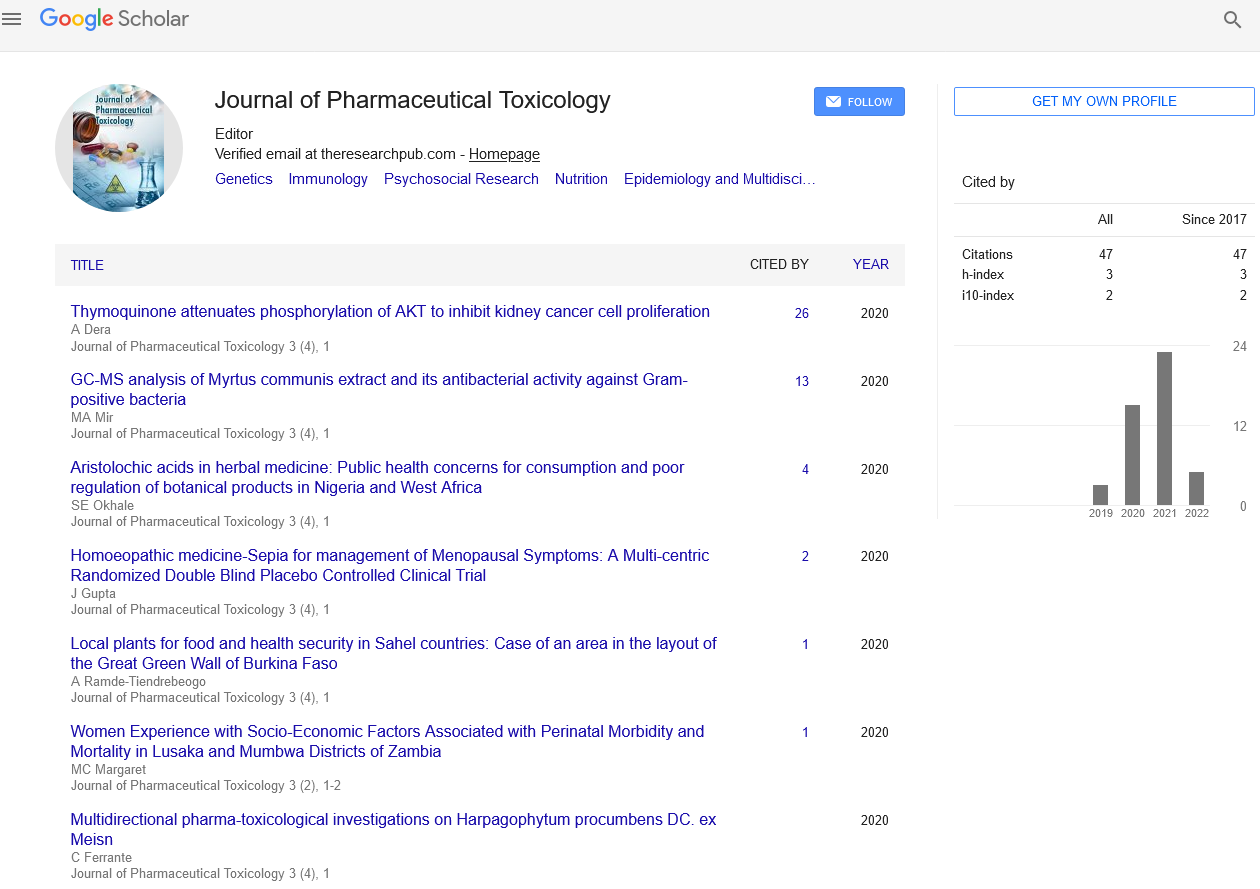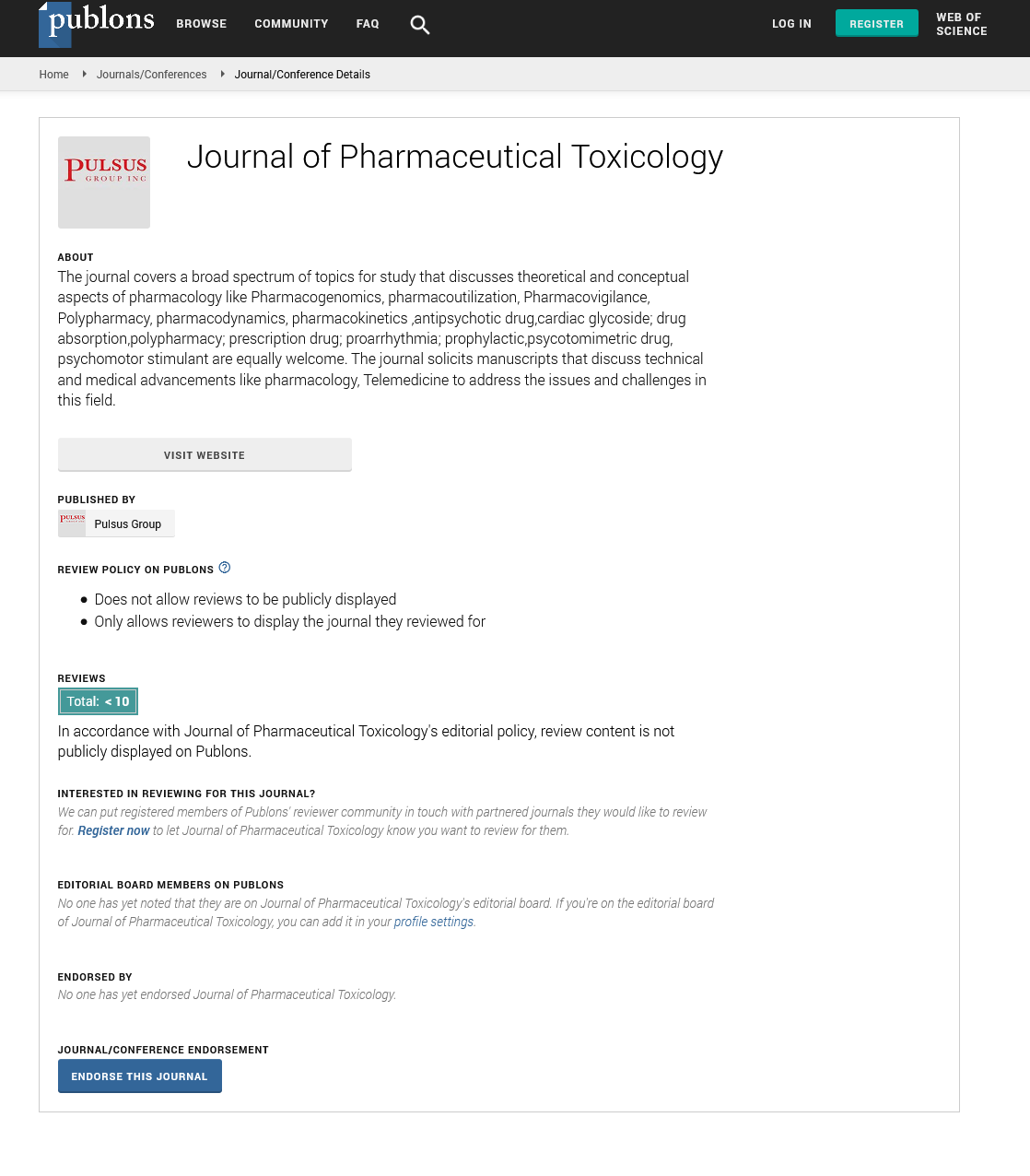Research Article - Journal of Pharmaceutical Toxicology (2023) Volume 6, Issue 2
Title: The Importance of Clinical Trials in Advancing Medical Research
Brian Berridge*
Department of Pathology, University of Sydney, Australia
Department of Pathology, University of Sydney, Australia
E-mail: brian.berridge221@gmail.com
Received: 03-April-2023, Manuscript No. jpt-23-96214; Editor assigned: 06-April-2023, PreQC No. jpt-23- 96214 (PQ); Reviewed: 20-April-2023, QC No. jpt-23-96214; Revised: 21-April-2023, Manuscript No. jpt-23- 96214 (R); Published: 28-April-2023 DOI: 10.37532/jpt.2023.6(2).40-43
Abstract
Clinical trials are an essential component of medical research, providing the necessary evidence for the development and approval of new treatments and therapies. These trials involve testing the safety and efficacy of new drugs, medical devices, and interventions on human subjects under controlled conditions. Clinical trials are crucial for ensuring that new treatments are safe and effective and that they meet regulatory requirements before they can be approved for use in the general population. In this article, we will explore the importance of clinical trials in advancing medical research and the benefits they provide. Clinical trials are critical for advancing medical research for several reasons. Firstly, they help to identify new and innovative treatments for diseases and medical conditions that have previously been unresponsive to existing therapies. Through these trials, researchers can determine whether a new drug or medical device is safe and effective and how it compares to existing treatments
Keywords
Covid-19 • Clinical trial • Pharmacology
Introduction
Secondly, clinical trials are essential for determining the appropriate dosage and administration of new drugs and medical devices. This information is necessary for ensuring that the treatment is safe and effective for patients and for minimizing any potential side effects. Thirdly, clinical trials provide valuable data on the long-term safety and efficacy of treatments. This information is crucial for identifying any potential risks or adverse effects that may not have been detected during the initial testing phase. Finally, clinical trials help to improve the quality of medical care by promoting evidence-based medicine. Through clinical trials, healthcare professionals can access the latest and most accurate information on the effectiveness and safety of new treatments, allowing them to make more informed decisions when treating their patients.
Participating in clinical trials provides several benefits for patients, including access to new and innovative treatments that may not be available through other means. Clinical trials also provide patients with access to expert medical care and monitoring throughout the trial period, which can help to improve their overall health and wellbeing. Moreover, participating in clinical trials can give patients a sense of empowerment and control over their health. By participating in these trials, patients can contribute to the advancement of medical research and potentially help to improve the lives of others.
Clinical trials are critical for advancing medical research and improving the quality of medical care [1,3]. They provide valuable data on the safety and efficacy of new treatments and help to identify new and innovative therapies for diseases and medical conditions. By participating in clinical trials, patients can access the latest and most advanced treatments and contribute to the advancement of medical research. Therefore, it is important to continue to support and promote clinical trials as a crucial component of medical research. Clinical trials are an essential part of medical research, providing scientists and healthcare professionals with valuable insights into the safety and effectiveness of new treatments and medications. For patients, clinical trials offer an opportunity to access cutting-edge therapies that may not yet be available through conventional treatment options. However, despite the potential benefits, many people are hesitant to participate in clinical trials due to a lack of understanding of the process or concerns about safety and efficacy. This article aims to provide a comprehensive guide to clinical trials, addressing common misconceptions and concerns and helping individuals make informed decisions about participating in medical research studies.
Discussion
Clinical trials are research studies that involve human volunteers and are designed to evaluate the safety and efficacy of new drugs, medical devices, or other interventions. These trials are conducted in phases, with each phase serving a specific purpose in the evaluation process. Phase 1 trials are typically the first step in evaluating a new treatment, focusing on establishing the safety and tolerability of the intervention in healthy volunteers. Phase 2 and 3 trials involve larger groups of participants and are designed to evaluate the effectiveness of the intervention in treating specific conditions or diseases. Clinical trials play a critical role in advancing medical knowledge and improving patient care. They provide researchers with essential data on the safety and efficacy of new treatments, helping to identify promising therapies that can improve patient outcomes. For patients, clinical trials offer the opportunity to access new treatments that may not yet be available through conventional treatment options. In some cases, participating in a clinical trial may be the only way for patients to access cutting-edge therapies that could potentially save their lives [4,5].
Like any medical intervention, clinical trials come with risks and benefits that must be carefully considered before deciding to participate. Some of the potential benefits of participating in a clinical trial include access to new treatments, the opportunity to receive more frequent medical care, and the potential to contribute to medical knowledge and help others in the future. However, there are also potential risks, including the possibility of experiencing side effects from the intervention, the risk of receiving a placebo instead of an active treatment, and the possibility that the treatment may not be effective in treating the condition or disease.
Clinical trials are conducted according to strict protocols, which outline the procedures that will be followed throughout the study. These protocols are designed to ensure the safety of participants and the accuracy of the data collected. Participants are typically randomly assigned to either a treatment group or a control group, with the control group receiving either a placebo or standard of care treatment. The study is then conducted over a predetermined period, during which time participants are closely monitored to assess the safety and efficacy of the intervention.
Each clinical trial has specific eligibility criteria that must be met in order to participate. These criteria may include factors such as age, gender, medical history, and current health status. Eligibility criteria are designed to ensure that participants are representative of the population that the intervention is intended to treat and that the results of the study are applicable to the target patient population.
There are several resources available to help individuals find clinical trials that they may be eligible to participate in. These include clinical trial registries such as ClinicalTrials.gov, which provides a comprehensive database of ongoing and completed clinical trials around the world. Patients can also consult with their healthcare provider or local medical research institutions to learn about available clinical trial opportunities.
If you decide to participate in a clinical trial, you can expect to undergo a thorough screening process to determine Clinical trials are a vital part of medical research, providing valuable information about new treatments, drugs, and medical devices. The primary aim of clinical trials is to determine the safety and effectiveness of these interventions in human subjects. The data collected from clinical trials helps to inform medical decision-making and shape the future of healthcare [5,6].
This article aims to provide an overview of clinical trials, including their importance, the process of conducting clinical trials, and the challenges and ethical considerations involved. We will also discuss some of the latest developments and innovations in clinical trial research. Clinical trials are essential for advancing medical knowledge and improving patient care. They are used to test new treatments, therapies, and medical devices before they can be approved for general use. Clinical trials help to determine the safety and efficacy of these interventions, and they are a critical part of the drug development process.
Clinical trials also help to identify potential risks and side effects associated with new treatments. This information is crucial in determining the appropriate use of new therapies and devices and helps healthcare providers make informed decisions about patient care. Moreover, clinical trials also play a critical role in addressing health disparities. Minorities and underrepresented populations have historically been underrepresented in clinical trials, resulting in disparities in healthcare outcomes. By actively recruiting diverse study populations, clinical trials can help to reduce these disparities and ensure that new treatments are effective across different patient populations [7-10].
The process of conducting clinical trials is a rigorous and complex one. It typically involves four phases, each with its own set of objectives and requirements. In this phase, researchers test a new treatment or intervention on a small group of healthy volunteers. The primary objective is to evaluate the safety and dosage of the intervention. These studies are usually conducted in a controlled environment, such as a hospital or clinic, and involve frequent monitoring and data collection.
In this phase, researchers test the safety and efficacy of the intervention on a larger group of patients. The primary objective is to determine the optimal dosage and treatment regimen. These studies are typically conducted in a hospital or clinical setting, and patients are closely monitored for adverse effects. In this phase, researchers compare the new treatment or intervention with the current standard of care. The primary objective is to determine the effectiveness of the new intervention and its potential benefits over existing treatments. These studies are typically conducted in multiple sites, and patients are randomly assigned to receive either the new intervention or the standard of care.
Phase IV Trials: In this phase, researchers continue to monitor the safety and effectiveness of the intervention after it has been approved for use by regulatory authorities. These studies may involve long-term follow-up and may be conducted in real-world settings, such as clinics or hospitals. Clinical trials present several challenges and ethical considerations. One of the primary challenges is recruitment and retention of study participants. It can be challenging to recruit a diverse group of patients, particularly from underrepresented populations. Researchers must work to build trust with potential participants and ensure that they understand the risks and benefits of participation.
Another challenge is ensuring that the study is conducted ethically and in compliance with all applicable regulations and guidelines. Researchers must obtain informed consent from all participants, ensure that the study is designed to minimize harm, and follow strict protocols for data collection and analysis. Moreover, clinical trials must adhere to ethical principles such as respect for persons, beneficence, and justice. These principles require that researchers respect the autonomy of study participants, act in their best interests, and ensure that the benefits and risks of participation are distributed fairly.
Clinical trials have seen several recent developments and innovations that are shaping the future of Clinical trials are the backbone of the healthcare industry, where researchers test new drugs and treatments for various diseases and conditions. They play a crucial role in bringing new medicines and therapies to the market and improving patient outcomes. The purpose of this article is to provide a comprehensive understanding of clinical trials, including their purpose, process, and importance. Clinical trials are research studies that evaluate the safety and effectiveness of new drugs, medical devices, and treatments for human use. These trials are conducted to determine whether a new drug or treatment is safe and effective for patients and whether it has any adverse side effects.
Clinical trials are typically divided into four phases. Phase I trials involve testing the drug or treatment on a small group of healthy volunteers to determine its safety and dosage. Phase II trials involve testing the drug or treatment on a larger group of patients to determine its efficacy and side effects. Phase III trials involve testing the drug or treatment on an even larger group of patients to confirm its efficacy, safety, and side effects. Phase IV trials are post-marketing studies conducted after the drug or treatment has been approved by regulatory authorities to monitor its long-term safety and effectiveness.
Clinical trials are essential for the development of new medicines and therapies. They provide valuable information about the safety and effectiveness of new drugs and treatments, which is necessary for regulatory approval and market access. Clinical trials also play a critical role in advancing medical knowledge and improving patient outcomes. Clinical trials are conducted in a controlled environment, where researchers can carefully monitor patients and collect data on their response to the drug or treatment. This data is then analyzed to determine the drug’s safety and effectiveness, and any adverse side effects. This information is critical for regulatory authorities to make informed decisions about approving the drug or treatment for market access. Clinical trials also help to identify new treatment options for patients with rare or difficult-to-treat conditions. These trials provide hope for patients who have exhausted all other treatment options and are facing life-threatening diseases.
The planning and design stage involves developing a protocol for the clinical trial. This includes defining the study population, selection criteria, treatment regimen, and outcome measures. The protocol must be approved by regulatory authorities and an ethics committee before the trial can begin. Recruiting participants for a clinical trial can be challenging. Researchers typically recruit participants through advertising, referrals from healthcare professionals, or through patient advocacy groups. Participants must meet specific eligibility criteria to participate in the trial. Before participating in a clinical trial, participants must provide informed consent. This involves providing the participant with information about the trial, including the risks and benefits, so they can make an informed decision about whether to participate.
Conclusion
During the treatment phase, participants receive the drug or treatment being tested. Researchers monitor participants closely to determine the drug’s effectiveness and any adverse side effects. After the treatment phase, participants are typically followed up to monitor their long-term health outcomes. This involves regular check-ups, laboratory tests, and imaging studies. The data collected during the clinical trial is analyzed to determine the drug’s safety and effectiveness. This data is then submitted to regulatory authorities for approval. Clinical trials are an essential component of the healthcare industry. They provide valuable information about the safety and effectiveness of new drugs and treatments, which is necessary for regulatory approval and market access. Clinical trials also play a critical role in advancing medical knowledge and improving patient outcomes. However, conducting clinical trials is a complex process that involves careful planning and execution.
Conflict of Interest
None
Acknowledgement
None
References
- Warren KA, Bahrani H, Fox JE et al. NSAIDs in combination therapy for the treatment of chronic pseudophakic cystoid macular edema. Retina. 30, 260-266 (2010).
- Schoenberger SD, Miller DM, Petersen MR et al. Nepafenac for epiretinal membrane surgery. Ophthalmol. 118, 1482-1482 (2011).
- Friedman DS, O’Colmain BJ, Munoz B et al. Prevalence of age-related macular degeneration in the United States. Arch. Ophthalmol. 122, 564-572 (2004).
- Maloney SC, Fernandes BF, Castiglione E et al. Expression of cyclooxygenase-2 in choroidal neovascular membranes from age-related macular degeneration patients. Retina. 29, 176-180 (2009).
- Hu W, Criswell MH, Ottlecz A et al. Oral administration of lumiracoxib reduces choroidal neovascular membrane development in the rat laser-trauma model. Retina. 25, 1054-1064 (2005).
- Chen E, Benz MS, Fish MH et al. Use of nepafenac (Nevanac) in combination with intravitreal anti-VEGF agents in the treatment of recalcitrant exudative macular degeneration requiring monthly injections. Clin Ophthalmol. 4, 1249-1252 (2010).
- Gomi F, Sawa M, Tsujikawa M et al. Topical bromfenac as an adjunctive treatment with intravitreal ranibizumab for exudative age-related macular degeneration. Retina. 32, 1804-1810 (2012).
- Zhou J, Wang S, Xia X et al. Role of intravitreal inflammatory cytokines and angiogenic factors in proliferative diabetic retinopathy. Curr Eye Res. 37, 416-420 (2012).
- Harris R, Beebe-Donk J, Namboodiri KK et al. Inverse association of non-steroidal anti-inflammatory drugs and malignant melanoma among women. Oncol Rep. 8, 655-657 (2001).
- Asgari MM, Maruti SS, White E et al. A large cohort study of Nonsteroidal anti-inflammatory drug use and melanoma incidence. J Natl Cancer Inst. 100, 967-971 (2008).
Google Scholar, Crossref, Indexed at
Google Scholar, Crossref, Indexed at
Google Scholar, Crossref, Indexed at
Google Scholar, Crossref, Indexed at
Google Scholar, Crossref, Indexed at
Google Scholar, Crossref, Indexed at
Google Scholar, Crossref, Indexed at
Google Scholar, Crossref, Indexed at
Google Scholar, Crossref, Indexed at


